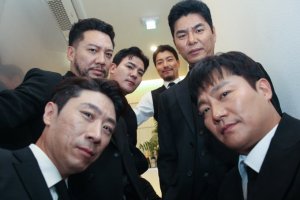Spotlight on South Korean issues with the military
I'm gonna be honest upfront: D.P. is a very interesting and insightful drama but I am not as praising as the rest of the reviews. I rarely review, mostly because of lack of time, but I thought a little diversity in opinions wouldn't hurt. If you want to read the rest of this review, it is then up to you.
So, shall we?
D. P. is the first drama that leaves me with a very strange feeling both as I was watching it and when I finished watching. It's not about the chilling violence, both psychological and physical, these men endure, nor is it the disturbing truth about the south korean (and I'm sure, from other countries) military.
I suppose I should start with the good pointsI found in this drama :
- The drama's message is well (and painfully for the viewers) transcribed and delivered. Of course, the numerous explicit scenes of abuse shows you just that, but the silences, whether it's from the other soldiers, Jun Ho, Ho Yeol or other characters, also manage to convey another insidious form of violence. Add to that the "Netflix production" label and you have a drama that will be talked about by a large number of people (thanks to/because of the short format and its easy accessibility) and who will be praised for it's directing and photography.
- This is no light topic the drama is dealing with and it's very rare to find medium be this critical and this brutally honest of such a big part of the South Korean life. Even if I'm becoming wary of Netflix productions, I must admit that the streaming platform has allowed recent dramas to explore more and more themes that are usually taboo in SK (homosexuality in Move to Heaven and So Not Worth It notably comes to mind). So hats off for the whole team who developped this story (inspired by true events I read) who makes you feel for these young men and empathise with their pain while shedding a huge spotlight on an important issue.
- The acting of the main cast was good. My congratulations to Jung Hae In and Koo Kyo Hwan especially who did well to portray soldiers scarred and troubled by their experience, yet still brought a touch of light comedy with their antics. Jumping from Reply 1988 right into D. P. was kind of a shock when I saw Kim Sung Kyun in such a different role but it simply highlights he has many cards up his sleeves. Jo Hyun Chul was also very sincere in his portrayal of private Cho Seok Bong and showcased well the slow descent into hell of a once kind-hearted man.
Having said that, you would probably assume my grade for the drama would be "good" (meaning as up to the average grade) and that my opinion is similar to that of others singing D. P.'s praise. But this is where the problems arise, so to speak. As much as D. P. has qualities, it also has flaws and it simply fell short, for me, as regards my own taste and appreciation of medium. Once again, let's detail this a bit:
- I simply. Felt bored. As much as the drama unveils a heavy story with an impactful message, I found myself looking at the clock more often than once despite the episodes being shorter than your typical drama episode. I felt that the plot was repetitive with a "deserter of the day" kind of plot whose backgrounds (except for episode 3) were more or less the same. I suppose it's to show just how large this instutionalised abuse is but in the end, even for a 6-episode drama, it fell short in keeping me interested in the plot, especially after the first two episodes when the interest started to dwindle down the drain until a slight rise in the last 20mn of the drama. Even though I admire the acting of the main cast, I couldn't get attached to one character or another (not that there are many to get attached to to begin with) and this something that prevented me from being truly connected to the story.
- The violence felt at times like a simple device of cheap shock-value to the point that I felt some of the gruesome scene simply lacked... something because of how much violence is shown. There are many ways to put violence into a story and I felt that the production often opted for a visual, almost voyeuristic, representation of it. Implication, black screen and sound and such can also represent violence, sometimes in an even more bone-chilling way than the graphic one.
- The music wasn't anything remarkable except the opening credits song. One could argue that for such a heavy drama, music becomes secondary but even the background music wasn't exceptionnaly good or even well timed. Moreover, dramas are famous for their OSTs and using songs and musics as "scene enhancers" and it's a shame to notice that the Korean Netflix productions (Kingdom, Move to Heaven, So Not Worth It, D. P. and others) are not putting in the same investment/interest. This may sound trivial in reviewing a drama but I'm a person who puts emphasis on the music so this is something I pay close attention while watchings dramas, movies and any other type of media.
Overall D. P. is an interesting drama whose message should be heard because it is important and they did well conveying it. But it wasn't enough for me to think of it as the masterpiece everyone is saying it is.
So, shall we?
D. P. is the first drama that leaves me with a very strange feeling both as I was watching it and when I finished watching. It's not about the chilling violence, both psychological and physical, these men endure, nor is it the disturbing truth about the south korean (and I'm sure, from other countries) military.
I suppose I should start with the good pointsI found in this drama :
- The drama's message is well (and painfully for the viewers) transcribed and delivered. Of course, the numerous explicit scenes of abuse shows you just that, but the silences, whether it's from the other soldiers, Jun Ho, Ho Yeol or other characters, also manage to convey another insidious form of violence. Add to that the "Netflix production" label and you have a drama that will be talked about by a large number of people (thanks to/because of the short format and its easy accessibility) and who will be praised for it's directing and photography.
- This is no light topic the drama is dealing with and it's very rare to find medium be this critical and this brutally honest of such a big part of the South Korean life. Even if I'm becoming wary of Netflix productions, I must admit that the streaming platform has allowed recent dramas to explore more and more themes that are usually taboo in SK (homosexuality in Move to Heaven and So Not Worth It notably comes to mind). So hats off for the whole team who developped this story (inspired by true events I read) who makes you feel for these young men and empathise with their pain while shedding a huge spotlight on an important issue.
- The acting of the main cast was good. My congratulations to Jung Hae In and Koo Kyo Hwan especially who did well to portray soldiers scarred and troubled by their experience, yet still brought a touch of light comedy with their antics. Jumping from Reply 1988 right into D. P. was kind of a shock when I saw Kim Sung Kyun in such a different role but it simply highlights he has many cards up his sleeves. Jo Hyun Chul was also very sincere in his portrayal of private Cho Seok Bong and showcased well the slow descent into hell of a once kind-hearted man.
Having said that, you would probably assume my grade for the drama would be "good" (meaning as up to the average grade) and that my opinion is similar to that of others singing D. P.'s praise. But this is where the problems arise, so to speak. As much as D. P. has qualities, it also has flaws and it simply fell short, for me, as regards my own taste and appreciation of medium. Once again, let's detail this a bit:
- I simply. Felt bored. As much as the drama unveils a heavy story with an impactful message, I found myself looking at the clock more often than once despite the episodes being shorter than your typical drama episode. I felt that the plot was repetitive with a "deserter of the day" kind of plot whose backgrounds (except for episode 3) were more or less the same. I suppose it's to show just how large this instutionalised abuse is but in the end, even for a 6-episode drama, it fell short in keeping me interested in the plot, especially after the first two episodes when the interest started to dwindle down the drain until a slight rise in the last 20mn of the drama. Even though I admire the acting of the main cast, I couldn't get attached to one character or another (not that there are many to get attached to to begin with) and this something that prevented me from being truly connected to the story.
- The violence felt at times like a simple device of cheap shock-value to the point that I felt some of the gruesome scene simply lacked... something because of how much violence is shown. There are many ways to put violence into a story and I felt that the production often opted for a visual, almost voyeuristic, representation of it. Implication, black screen and sound and such can also represent violence, sometimes in an even more bone-chilling way than the graphic one.
- The music wasn't anything remarkable except the opening credits song. One could argue that for such a heavy drama, music becomes secondary but even the background music wasn't exceptionnaly good or even well timed. Moreover, dramas are famous for their OSTs and using songs and musics as "scene enhancers" and it's a shame to notice that the Korean Netflix productions (Kingdom, Move to Heaven, So Not Worth It, D. P. and others) are not putting in the same investment/interest. This may sound trivial in reviewing a drama but I'm a person who puts emphasis on the music so this is something I pay close attention while watchings dramas, movies and any other type of media.
Overall D. P. is an interesting drama whose message should be heard because it is important and they did well conveying it. But it wasn't enough for me to think of it as the masterpiece everyone is saying it is.
Vond je deze recentie nuttig?

























